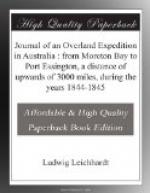lived six hours longer, when he began to bark, as
if raving, and to move his legs slightly, as dogs
do when dreaming. It seemed that he died of inflammation
of the brain. If we become naturally fond of animals
which share with us the comforts of life, and become
the cheerful companions of our leisure hours, our
attachment becomes still greater when they not only
share in our sufferings, but aid greatly to alleviate
them. The little world of animated beings, with
which we moved on, was constantly before our eyes;
and each individual the constant object of our attention.
We became so familiar with every one of them, that
the slightest change in their walk, or in their looks
was readily observed; and the state of their health
anxiously interpreted. Every bullock, every horse,
had its peculiar character, its well defined individuality,
which formed the frequent topic of our conversation,
in which we all most willingly joined, because every
one was equally interested. My readers will,
therefore, easily understand my deep distress when
I saw myself, on recent occasions, compelled to kill
two of our favourite bullocks long before their time;
and when our poor dog died, which we all had fondly
hoped to bring to the end of our journey. Brown
had, either by accident, or influenced by an unconscious
feeling of melancholy, fallen into the habit of almost
constantly whistling and humming the soldier’s
death march, which had such a singularly depressing
effect on my feelings, that I was frequently constrained
to request him to change his tune.
Oct. 17.—We travelled about eighteen miles
N. N. W. over an undulating country, in which Cypress-pine
thickets alternated with scrubby stringy-bark forest,
and some tea-tree flats. After seven miles, we
crossed a large dry creek, which went to the eastward;
and, eight miles further, we entered upon a fine box-flat,
with hills to the north and north-west. We followed
a very promising Pandanus creek, in which the presence
of Typha (flag, or bulrush) and a new species of Sesbania
indicated the recent presence of water. Mr. Roper
having ascended one of the hills, and seen a green
valley with a rich vegetation about three miles to
the northward, we in consequence left the creek, which
turned to the eastward; and, after passing several
miles of most wretched scrub, came into an open country,
with scattered groves of trees. As the sun was
setting, I resolved upon encamping in an open plain,
although without water, except what we carried in
our large stew-pot. Charley, who had been sent
forward, had not yet joined us; I, therefore, ordered
two guns to be fired, to let him know where we were;
he immediately answered us from a short distance,
where he lighted up a cheerful fire. After some
time, during which misfortune and carelessness had
played us the trick of upsetting our waterpot, Charley
arrived with the welcome news that he had found some
water-holes in a small creek; we therefore, at moonrise,
again saddled our tired animals, and repaired thither.




